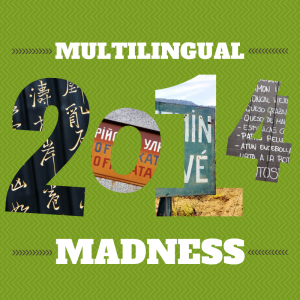How to Say ‘Multilingual Madness’ in Irish (Cuid 2/2) Posted by róislín on Apr 6, 2014 in Irish Language
(le Róislín)
![Though this be ... buile ... mire ... máine ... báiní ... gealtacht ... díth céille ... deargbhuile ... spadhar ... tallann mhearaí ...[OR] ... dúchas, yet there's method in't. (Hamlet, Gníomh II)](https://blogs.transparent.com/irish/wp-content/uploads/sites/17/2014/04/Delacroix-undated-II2-HamletPolonius.jpg)
“Though this be … buile … mire … máine … báiní … gealtacht … díth céille … deargbhuile … spadhar … tallann mhearaí …[OR] … dúchas, yet there’s method in’t.” (Hamlet, Gníomh II)
In the last blog, we looked at the word “multilingual” in Irish and discussed “ilteangach” and “ilbhéarlach” as the choices. Both use the prefix “il-” (“many;” also found in words like “ilghuthach” and “ilstórach“).
“Teangach,” as the core of the word “ilteangach,” is, of course, from “teanga” (tongue), and “-bhéarlach” (lenited after the prefix), is based on the more general meaning of “béarla” (i litreacha cás íochtair) as “speech.”
Today, the word “béarla” is generally capitalized (leis an “b” scríofa le ceannlitir, mar “Béarla”) and understood as “the English language.” Originally that distinction was created by the prefix “Saics-” which gave us “Saics-Bhéarla” for “English.” Eventually the “Saics-” part got dropped off, leaving just “Béarla.” Why it was “Saics-” instead of something with “Angla-” I’ve never actually found out–ábhar blag eile lá den tsaol?
At any rate, “ilteangach” seems to be the more general term in use today, so we’ll use that for the “multilingual” part of our phrase. But how about “madness,” as in the recent Transparent Language challenge, “Multilingual Madness”?
First, let me say that none of the following words for “madness” are really exact equivalents to “anger.” Here we’re looking more at “frenzy,” “wildness,” etc. “Anger” is usually expressed by “fearg” (also “racht feirge,” etc.). Admittedly, some of the distinctions are pretty fine. Also ábhar blag eile?
Here are 10 ways to say “madness” in Irish, with some additional possibilities for translations, and some sample terms or phrases that help distinguish the meanings. “Buile” and “mire” are quite similar, and are probably the best candidates for “madness” as we intend it here:
1. buile, madness, frenzy, mania; “Ailliliú, puilliliú, ailliliú tá an poc ar buile!”(The puck/billy goat is mad/crazy/ in a frenzy, líne ó amhrán traidisiúnta), and more recently, “brídeach bhuile” (bridezilla)
2. mire, madness, frenzy, mania ; this can also mean “quickness” or “rapidity,” related to “mear” (quick, quick-tempered, etc.)
3. máine, madness, mania (mostly in the medical sense); cleipteamáine (kleptomania)
4. báiní, madness, wildness, frenzy, fury. Chuaigh sé le báiní (He became furious).
5. gealtacht, madness, lunacy, panic; Chuaigh sé ar gealtacht (He went mad / He became terror-stricken).
6. díth céille, madness, foolishness, folly, lack of sense (céille, “of sense,” from “ciall“); Díth Céille Almayer is the name of the Irish translation of Joseph Conrad’s Almayer’s Folly.
7. deargbhuile, madness as in midsummer madness, stark madness, and raging madness; Bhí sé ar deargbhuile (He was raging mad).
8. spadhar, madness as in midsummer madness, temperamental fit; Tháinig spadhar air (A mad fit came over him).
9. tallann mhearaí, madness, as in midsummer madness, a fit of craziness or distraction; “N’fheadar cén tallann mhearaí a thug uirthi dul i bpáirt le Norma; go deimhin, is ionadh liom gur thoiligh sí dul isteach le haon duine (I don’t know what craziness made her ally herself with Norma; indeed, it amazes me that she was willing to go in with anyone, from “Tuairisc ó Láthair an Chatha,” gearrscéal le hÉadhmonn Mac Suibhne san iris Feasta, http://www.feasta.ie/2007/marta/alt4.html). On its own, “tallann” also has a wide variety of meanings, including a talent (of gold), talent (in music), a notion, and an attack.
 10. dúchas, madness (in animals, usually dogs, or other animals prone to rabies). Typically, “dúchas” means “heritage” or “native place,” but it can also mean “a natural affinity” (in general) or “a natural wild state”; Chuaigh an madra le dúchas (The dog went mad). “Madra dúchais” can mean a “mad dog,” although “confadh” is a more technical term for “rabies,” as in “madra confaidh” (mad/rabid dog). But context is always the bottom line, as we see in the phrase ”éan confaidh,” which is understood to mean “vulture” (i.e. a bird of raging or fury, but not “rabid” as such, in the medical sense). Of course, the more typical words for “vulture” are “bultúr” (used for most taxonomical purposes) and “badhbh” [pronounced “bive,” rhyming with “thrive” and “alive”].
10. dúchas, madness (in animals, usually dogs, or other animals prone to rabies). Typically, “dúchas” means “heritage” or “native place,” but it can also mean “a natural affinity” (in general) or “a natural wild state”; Chuaigh an madra le dúchas (The dog went mad). “Madra dúchais” can mean a “mad dog,” although “confadh” is a more technical term for “rabies,” as in “madra confaidh” (mad/rabid dog). But context is always the bottom line, as we see in the phrase ”éan confaidh,” which is understood to mean “vulture” (i.e. a bird of raging or fury, but not “rabid” as such, in the medical sense). Of course, the more typical words for “vulture” are “bultúr” (used for most taxonomical purposes) and “badhbh” [pronounced “bive,” rhyming with “thrive” and “alive”].
Well, that’s ten words for “madness,” anyway. There’s actually at least a good handful more, but they get farther away from our main theme, “multilingual madness.”
“Madness” in the sense of “multilingual madness” comes closest to “enthusiasm” or, in a positive sense, “frenzy.” So which of the above words do you think best fits the buile, oops, bill. Please stay tune for another blog or two on the topic while we make the final decision. Moltaí ar bith ar an aistriúchán? And remember, mar a dúirt an Bard (trí ghuth Polonius), “Though this be madness, yet there’s method in’t” (Hamlet). SGF – Róislín

Build vocabulary, practice pronunciation, and more with Transparent Language Online. Available anytime, anywhere, on any device.




Leave a comment: